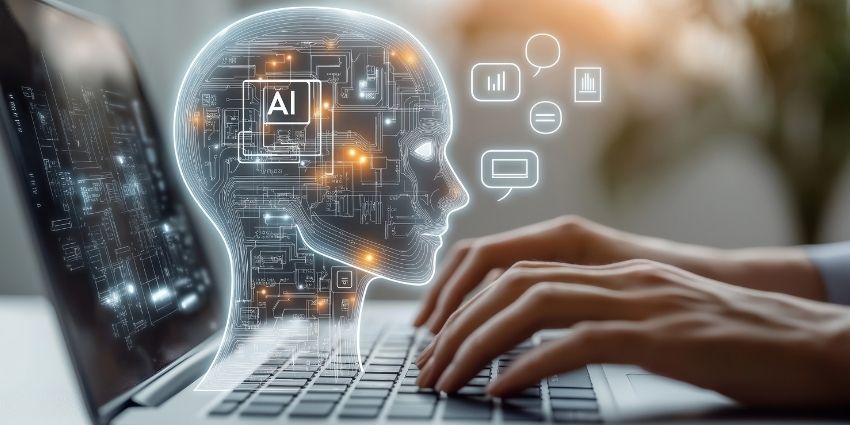If you’ve been exploring enterprise AI use cases lately, you probably already know that the potential for artificial intelligence is virtually limitless. Across industries, companies are tapping into AI solutions to not just automate tasks, but improve productivity, enhance creativity, transform customer service, and even manage security and compliance risks.
It’s not surprising that analysts like IDC say global spending on AI will likely soar to around $632 billion by 2028 – almost doubling from today’s investment levels.
AI is becoming more accessible, more versatile, and more sophisticated, adapting to the needs of every sector and organization. But how exactly are companies actually using AI to drive measurable value? What are the biggest use cases across major industries, and what will the future hold for forward-thinking AI adopters?
Major Enterprise AI Use Cases Across Industries
Enterprise AI use cases have evolved a lot in just a few years. Major technology vendors are beginning to take a more strategic approach to solving genuine business problems with specialist models and systems, switching from “generic AI” to enterprise-ready systems that deliver a tangible return on investment – fast.
Here’s a closer look at how companies across major industries are using AI to transform operations today.
Enterprise AI Use Cases in Finance: Efficiency, Compliance, and Security
The finance sector is one of the biggest early adopters of artificial intelligence. After all, this industry needs to process huge amounts of data fast for a range of tasks. Finance leaders are using AI to improve risk assessment strategies, enhance fraud detection, and even enable algorithmic trading.
For instance, machine learning (ML) algorithms can analyze transaction patterns to detect anomalies indicative of fraudulent activity, assess credit risk more accurately, and execute trades instantly, all without human intervention.
Inscribe uses AI risk agents designed with Anthropic’s Claude model to power its fraud detection, risk analysis, and document verification tools, reducing data review times by 20x. Plaid, a financial services company, faced significant challenges with document fraud, with 61% of lending leaders reporting experiences of such fraud. They introduced AI-driven solutions, significantly reducing fraud issues, enhancing team efficiency, and minimizing compliance risks.
Some finance companies are even beginning to build AI-powered assistants that can act as personal investment consultants for clients, improving customer loyalty.
AI Use Cases in Healthcare: Diagnostics, Analytics, and Patient Care
Healthcare is another sector packed with incredible enterprise AI use cases. Medical companies are using AI tools to boost predictive analytics, improve diagnostics, and even streamline operations. For instance, Microsoft’s new Dragon Copilot is specifically designed to enhance workflows by automating routine tasks like generating orders and clinical summaries.
70% of the early adopters using Dragon Copilot say it reduces feelings of fatigue and burnout, and 93% say their patients report better overall experiences.
Elsewhere, Oscar Health says that implementing generative AI tools has reduced the time it takes to resolve insurance escalation issues by 50%, while improving the accuracy of teams.
On a broader scale, AI-enabled solutions can optimize how we identify and resolve healthcare issues. AI-enabled computer vision tools with machine learning models can identify patterns and anomalies in imaging data, leading to faster, more precise diagnoses.
Artificial intelligence is even helping major pharmaceutical companies experiment with new drugs and treatments in a safe environment. Without AI models, we wouldn’t have been able to create the COVID-19 vaccination so quickly.
AI in Manufacturing: Optimization and Predictive Maintenance
Manufacturing companies are another example of a group keen to explore new enterprise AI use cases. Many organizations have turned to AI to help streamline predictive maintenance. For instance, Siemens integrated generative AI into its Senseye Predictive Maintenance platform, enhancing human-machine interactions and making predictive maintenance more intuitive.
Other companies are using AI to enhance quality assurance – like Bosch – a company using AI tools to track operational performance, and minimize production errors.
AI solutions can also assist manufacturing teams by analyzing historical and real-time data to suggest process improvements or strategies for optimizing supply chains. The manufacturing industry is even experimenting with new forms of physical AI. AI-powered humanoid robots are making their way into specific sectors, like the automotive space, where they’re helping to reduce production times.
For instance, the new Figure 03 robot designed for manufacturing can produce parts that took a week to make with traditional CNC machines in just 20 seconds.
Enterprise AI Use Cases in Retail: Personalization, Efficiency, and Service
Retailers harness AI to personalize customer experiences, deploy chatbots for customer service, and manage inventory more effectively. AI tools can use customer data to offer tailored recommendations, automate responses to inquiries, and predict stock requirements. They can improve customer experience, boost sales, and reduce inefficiencies.
For instance, Amazon’s AI shopping assistant, Rufus, helps customers find products relevant to their interests using real-time and historical data. Amazon’s internal forecasts estimate that Rufus will indirectly generate more than $700 million in operating profits going forward.
Elsewhere, major leaders like Target have implemented AI-driven inventory management systems. This solution uses machine learning models and IoT devices to deliver accurate inventory data to business leaders across 2,000 connected stores.
Some retailers even use AI to enable dynamic price optimization strategies, improve supply chain management, and develop advanced sales and marketing strategies.
AI in Security: Cybersecurity and Computer Vision
AI might create security, compliance, and governance concerns for enterprises, but it can also help them tackle major security issues. Companies in various industries exploring enterprise AI use cases are using AI tools to boost cybersecurity with advanced threat detection and response functions.
Machine learning models analyze patterns to identify anomalies, while computer vision aids in surveillance and monitoring. Microsoft introduced its AI Copilot for Security to various companies to bolster their cyber defenses. The AI copilot leverages global threat intelligence to respond to threats at machine speed and scale, addressing challenges posed by sophisticated cyber attackers.
AI tools can accelerate root cause analysis, empowering IT teams to identify the underlying reasons behind incidents faster. They can also provide access to predictive tools that help companies to optimize network operations and track gaps in data protection strategies.
Other Enterprise AI Use Cases to Consider
The enterprise AI use cases mentioned above are just the beginning. In virtually every industry, AI is transforming how teams operate. Over in agriculture, companies are using AI-powered sensors and drones to manage tasks and dramatically improve yields autonomously.
Within the legal landscape, companies can simplify document-heavy and tedious processes with AI, predicting outcomes for cases, and extracting critical information from documents in seconds. Even in education, AI tools are facilitating personalized learning experiences at scale.
In the development space, AI solutions are streamlining code development – the point where some companies (like Anthropic) believe 100% of code will be written by AI in the near future. Then we’ve got plenty of use cases to consider that benefit all companies, regardless of industry, like the benefits of AI for content creation, customer service, and data analysis.
The Evolution of Enterprise AI Use Cases
We’re entering an era when companies aren’t just looking at AI as a way to automate mundane tasks anymore. They are exploring a vast selection of enterprise AI use cases, experimenting with cutting-edge new models, purpose-driven systems, and even AI-powered humanoid robotics.
Of course, a successful strategy for implementing AI into the enterprise relies on more than just identifying the right use cases. Companies also need a comprehensive strategy – one that considers the need for employee upskilling, model governance, and security.








